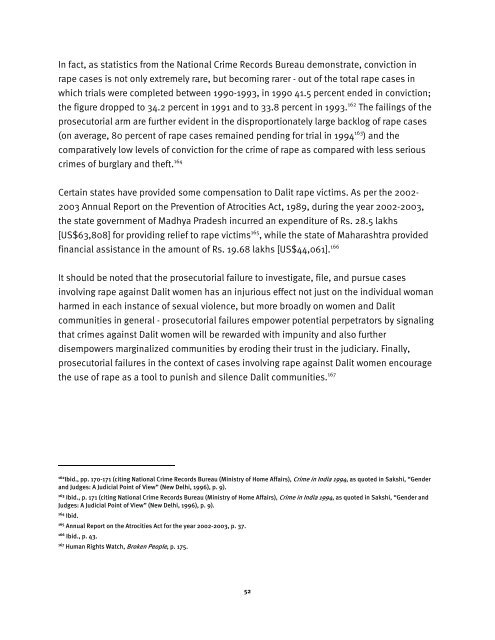Caste Discrimination against India's âUntouchablesâ - Human Rights ...
Caste Discrimination against India's âUntouchablesâ - Human Rights ...
Caste Discrimination against India's âUntouchablesâ - Human Rights ...
Create successful ePaper yourself
Turn your PDF publications into a flip-book with our unique Google optimized e-Paper software.
In fact, as statistics from the National Crime Records Bureau demonstrate, conviction in<br />
rape cases is not only extremely rare, but becoming rarer - out of the total rape cases in<br />
which trials were completed between 1990-1993, in 1990 41.5 percent ended in conviction;<br />
the figure dropped to 34.2 percent in 1991 and to 33.8 percent in 1993. 162 The failings of the<br />
prosecutorial arm are further evident in the disproportionately large backlog of rape cases<br />
(on average, 80 percent of rape cases remained pending for trial in 1994 163 ) and the<br />
comparatively low levels of conviction for the crime of rape as compared with less serious<br />
crimes of burglary and theft. 164<br />
Certain states have provided some compensation to Dalit rape victims. As per the 2002-<br />
2003 Annual Report on the Prevention of Atrocities Act, 1989, during the year 2002-2003,<br />
the state government of Madhya Pradesh incurred an expenditure of Rs. 28.5 lakhs<br />
[US$63,808] for providing relief to rape victims 165 , while the state of Maharashtra provided<br />
financial assistance in the amount of Rs. 19.68 lakhs [US$44,061]. 166<br />
It should be noted that the prosecutorial failure to investigate, file, and pursue cases<br />
involving rape <strong>against</strong> Dalit women has an injurious effect not just on the individual woman<br />
harmed in each instance of sexual violence, but more broadly on women and Dalit<br />
communities in general - prosecutorial failures empower potential perpetrators by signaling<br />
that crimes <strong>against</strong> Dalit women will be rewarded with impunity and also further<br />
disempowers marginalized communities by eroding their trust in the judiciary. Finally,<br />
prosecutorial failures in the context of cases involving rape <strong>against</strong> Dalit women encourage<br />
the use of rape as a tool to punish and silence Dalit communities. 167<br />
162 Ibid., pp. 170-171 (citing National Crime Records Bureau (Ministry of Home Affairs), Crime in India 1994, as quoted in Sakshi, “Gender<br />
and Judges: A Judicial Point of View” (New Delhi, 1996), p. 9).<br />
163<br />
Ibid., p. 171 (citing National Crime Records Bureau (Ministry of Home Affairs), Crime in India 1994, as quoted in Sakshi, “Gender and<br />
Judges: A Judicial Point of View” (New Delhi, 1996), p. 9).<br />
164<br />
Ibid.<br />
165<br />
Annual Report on the Atrocities Act for the year 2002-2003, p. 37.<br />
166<br />
Ibid., p. 43.<br />
167<br />
<strong>Human</strong> <strong>Rights</strong> Watch, Broken People, p. 175.<br />
52

















